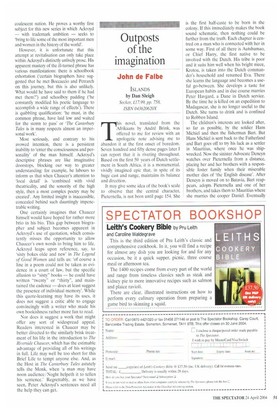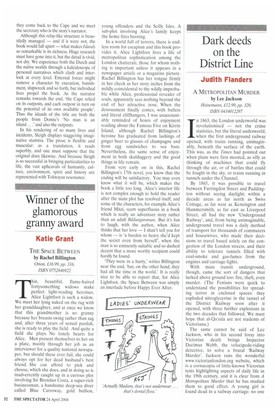Outposts of the imagination
John de Falbe
ISLANDS by Dan Sleigh Secker, f17.99, pp. 758, ISBN 043620620X
This novel, translated from the Afrikaans by Andre Brink, was offered to me for review with an apologetic note advising me to abandon it at the first onset of boredom. Seven hundred and fifty dense pages later I can report that it is riveting throughout. Based on the first 50 years of Dutch settlement in South Africa. it is a monumental, vividly imagined epic that, in spite of its huge cast and range, maintains its balance and direction.
It may give some idea of the book's scale to observe that the central character, Pieternella, is not born until page 154. She is the first half-caste to be born in the colony. If this immediately makes the book sound schematic, then nothing could be further from the truth. Each chapter is centred on a man who is connected with her in some way. First of all there is Autshumao, or Chief Harry, the first native to be involved with the Dutch. His tribe is poor and it suits him well when his bright niece, Krotoa, is taken into the Dutch commander's household and renamed Eva. There she learns the language and becomes a useful go-between. She develops a taste for European habits and in due course marries Peter Havgard, a Dane in Dutch service. By the time he is killed on an expedition to Madagascar, she is no longer useful to the Dutch. She turns to drink and is confined to Robben Island.
The children's interests are looked after, so far as possible, by the soldier Hans Michiel and then the fisherman Bart. But Hans Michiel is sent back to the Fatherland and Bart goes off to try his luck as a settler in Mauritius, where once he was shipwrecked. Now the sinister Advocate Deneyn watches over Pieternella from a distance, placing her and her brothers with a responsible foster family when their miserable mother dies of 'the English disease'. After Deneyn is moved on to Batavia, Bart reappears, adopts Pieternella and one of her brothers, and takes them to Mauritius where she marries the cooper Daniel. Eventually they come back to the Cape and we meet the secretary who is the story's narrator.
Although this relay-like structure is beautifully managed — and if it were not, the book would fall apart — what makes Islands so remarkable is its richness. Huge research must have gone into it, but the detail is vivid, not dry. We experience both the Dutch and the native worlds through a kaleidoscope of personal narratives which clash and interlock at every level. External forces might remove a character by execution, banishment, shipwreck and so forth, but individual lives propel the book. As the narrator remarks towards the end, 'the Cape relied on its outposts, and each outpost in turn on the potential of its own available people'. Thus the islands of the title are both the people from Donne's 'No man is an island. . .' and also the outposts.
In his rendering of so many lives and incidents, Sleigh displays staggering imaginative stamina. The prose is flexible and muscular: as a translation, it reads superbly, and one must suppose that the original does likewise. And because Sleigh is so successful in bringing particularities to life, the vast upheavals of humanity, culture, environment, spirit and history are represented with Tolstoyan resonance.



















































































 Previous page
Previous page